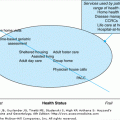Social Work: Introduction
Social workers provide services to older patients across a continuum of care needs that range from supporting community living to providing palliative care services at the end of life. This occurs in many different health care arenas including institutional settings, such as acute care hospitals, chronic care settings, and nursing homes, as well as in patients’ homes in the community. Social workers support and enhance the adaptive capacities of patients within their living environments and are knowledgeable about interviewing, assessment, and intervention in social problems faced by individuals, couples, families, and groups. Using negotiating skills, social workers mediate conflicts and obtain resources for clients and their families. Knowledge of group process makes social workers effective in forming natural helping networks and serving as members of interdisciplinary teams. Their expertise in coordinating services within a single organization or across different agencies or settings helps to ensure appropriate and adequate care for older patients.
While 76% of social workers in a health care settings work with older patients, not all social workers have specialized training in geriatrics. This is changing rapidly, primarily through training efforts sponsored by the Hartford Foundation’s initiative established in 1999. Such training enhances social workers’ awareness of older people’s needs and subsequently leads to better quality of care by helping social workers provide the appropriate services at the right time. Proper care provided by gerontologically trained professionals including social workers can reduce the cost of care by 10% each year in hospitals, nursing homes, and patients’ homes as well as improve psychosocial outcomes and reduce mortality.
Key Roles for Geriatric Social Workers
The roles social workers play vary within health care settings (Tables 27-1 and 27-2). Social workers provide direct service to elders as well as facilitate linkages between service workers and agencies.
ROLES | DESCRIPTION | EXAMPLES |
|---|---|---|
Group worker | Social worker plans and conducts group activities for clients to help understand themselves better through a variety of methods; can be therapeutic, educational, social, or for support | Worker organizes a group for grandparents raising grandchildren to share information and provide support |
Advocate | Social worker fights for, defends, and promotes patient’s perspectives and rights | Social worker helps a patient destined for a nursing home receive home health care rather than be institutionalized |
Case manager | Social worker assesses patient needs, connects patient to resources, and coordinates and oversees delivery and participation of services | The case manager coordinates the services. A patient might need rehabilitation therapy, psychotherapy, and home health care as well as transportation services |
Educator | Social worker offers knowledge regarding health care information, processes, and procedures with patients and provides knowledge of patient with the team | In hospice, the social worker provides information regarding the dying process, pain management, stages of grief, and option for burial services |
Discharge planner | Social worker prepares patient for next phases of departure from facility by designing a course of action | When patient leaves the hospital and goes home, the social worker may arrange transportation services, meal delivery, home care services, and assessment of home for safety |
Therapist | Social worker engages clients in interpersonal interactions regarding client’s behavior, feelings, attitudes, and perceptions | Social worker works with an older couple who is having marital problems resulting from stress of caregiving |
Team member | Social worker collaborates with health professionals to provide efficient delivery of services | Social worker shares information with physicians and nurses and provides insight into the patient’s cultural and personal life |
Broker | Social worker connects patients to most relevant resources | Social work brokers help African-American elders overcome the racial and ethnic disparities they face in receiving health care, by building trust between the patient and health care professionals |
Information and referral | Social worker has knowledge of community resources and offers connection to these agencies | Social worker has knowledge of respite care services and links caregiver of Alzheimer patient to the respite care agency |
Mediator/arbitrator/advocate | Social worker facilitates conflict resolution | The social worker advocates for the older patient in a guardianship hearing |
SETTINGS | ROLES |
|---|---|
Home | Support patients’ adjustment to health status, provide emotional support, address barriers in access to medical care (i.e., transportation), provide education so that patient can make informed decisions, assess social support and referral to resources, and case management |
Hospital | Assessment; discharge planning; prevention and treatment of mental and physical health; promotion of psychosocial health, advocacy in relation to aspects of human diversity; mediate between patients, families, and the health care team; group work; psychotherapy |
Nursing home | Financial planning; psychosocial assessment and addressing emotional needs; care planning; mediation between residents, staff, and family; linking residents and families to resources |
Assisted-living facility | Negotiate placement and transition, support in navigating decision-making and emotions regarding changes in autonomy, financial planning, and fostering communication |
Senior center | Administration, program planning, case management, facilitate group and individual therapy, address life transitions, and organize advocacy groups |
Dept of Public Welfare | Case management, oversee and evaluate programs, community outreach, advocacy, development of services, income assistance, protective services, support parents raising grandchildren |
Community mental health setting | Perform client assessments, conduct support groups, provide emergency and crisis services to older mental health clients and their families; referral to other resources in the community such as adult day care, respite services, and partial day treatment programs |
Hospice | Liaison between care settings; case manager; address psychosocial needs of families and patients; support for adjustment to setting, treatment, illness, and death; educator, advocate, broker, and mediator between family members, patient, and medical professionals; team member; information and referral; group worker; and counselor |
Adult day care/respite program | Assess clients’ mental and physical abilities, plan and facilitate activities to maximize physical and cognitive functioning, facilitate support groups, provide information and support for Alzheimer’s and other disease processes, and referral to community resources |
Primary care | Plan and implementation of safety and illness prevention programs, identify social factors that support prevention of illness and cause of disease, provide emotional and social support, facilitate support groups around a specific disease or mental illness, and provide education, information, and referral |
Social workers meet face to face with patients and consumer groups to provide services as caseworkers, marital or family therapists, and group worker or educators. Individual casework and counseling services help elders who have mental health problems or need help with resolving issues in such areas as housing, finances, or interpersonal problems. Martial and family therapies include meeting with individual elders, with marital partners, as well as with groups of elders who are experiencing concerns related to their families. This could involve helping elderly grandparents be more effective in raising their grandchildren, aiding families in coping with an elderly parent with a dementing illness, or supporting elderly couples as they struggle with debilitating health problems, which strain the emotional resources necessary to maintain their marriage bonds. Group work services include support groups for elders with a variety of health concerns, such as those who have cancer, low vision, or early-stage dementia. Support groups have been particularly helpful to caregivers of patients with such diseases as Alzheimer’s. These groups run by social workers help caregivers better understand the disease process and provide information that helps them deal with the problems of caregiving more effectively and thus improve the disease outcome. Groups also focus on self-help issues, where elders learn to deal with such problems as alcoholism or smoking. Psychotherapy groups work to resolve such concerns as abuse (as victim or perpetrator), depression, and marital problems. Social workers also work directly with older adults and their families as educators and disseminators of information. For instance, they provide educational sessions on caregiving, stress management, and various aspects of mental and physical health care.
Social workers link elderly individuals to the services they need. This may be because agencies are not meeting the older person’s needs, because elders themselves lack knowledge of available resources or ability to access those resources, or because elders and their families need help in overcoming fears and concerns they might have about using services. For instance, family members who are struggling to provide home care to their mother with Alzheimer’s disease may be reluctant to use a support or educational group of other family members in similar circumstances for fear of revealing the personal problems their mother faces. Social workers can help overcome these fears by helping family members realize that all families where a family member has a dementing illness face similar problems and have similar reactions to their circumstances. Social workers also work as case managers to help elders receive services in a timely fashion. In general, case management involves screening, assessment, care planning, implementation, monitoring, and reassessment to evaluate ongoing service needs. Case management meets a variety of goals in numerous settings. The social worker assesses the elder’s problems and needs to determine eligibility for services as well as financial resources and links elders to the needed services. Family and friends may provide collateral information to help the social worker determine their capacity for support. Goals for a care plan are set by discussing the elderly patients’ perception of their needs. Interventions are then designed to meet these goals. Resources are identified to this end. Subsequently, the social worker monitors the delivery of the services. When care is needed over a longer period of time, the needs of elders are reevaluated. Ultimately, an outcome evaluation is conducted to determine if the patient’s goals were achieved.
Social workers also work as mediators and advocate for their clients/patients. As mediators, social workers determine the issues behind a conflict. Social workers facilitate family discussion of issues identified by the family and elders as important. For example, adult guardianship mediation can be used to discuss how the family can best help elders to preserve autonomy (or to maximize his/her greatest level of independent functioning). When advocating for their clients, social workers often form partnerships with lawyers to aid victimized elders who need legal redress. For example, social workers and lawyers can aid gays, lesbians, bisexuals, and transgendered (GLBT) elders who face housing and service delivery discrimination in accessing benefits to which they are entitled.
Practice Issues with Populations Served
Geriatric social workers strive to meet the basic human needs of all elders, with a particular emphasis on those who are vulnerable owing to oppression and poverty. With health care provided in a myriad of public and private settings, the social worker acts as a broker, a mediator, and an advocate for clients.







